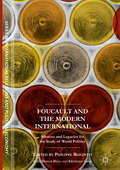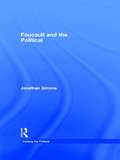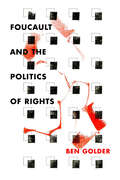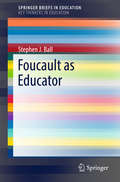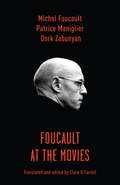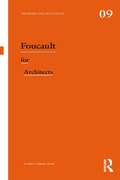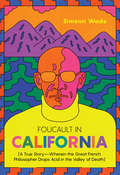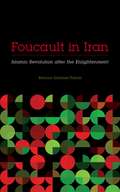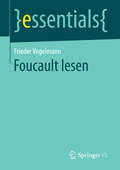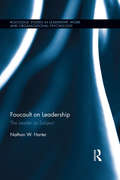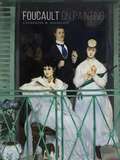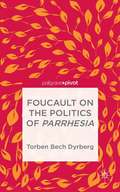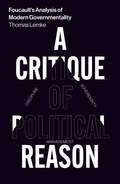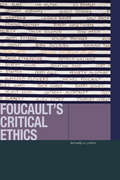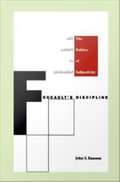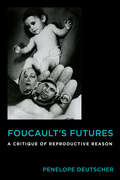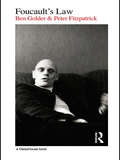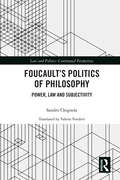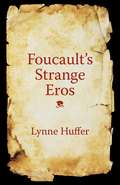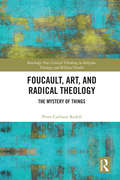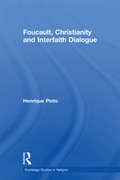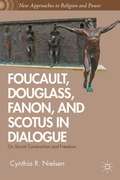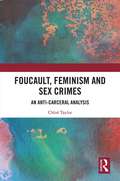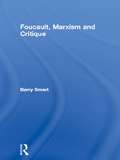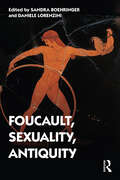- Table View
- List View
Foucault and the Modern International: Silences and Legacies for the Study of World Politics (The Sciences Po Series in International Relations and Political Economy)
by Philippe Bonditti, Didier Bigo and Frédéric GrosThis book addresses the possibilities of analyzing the modern international through the thought of Michel Foucault. The broad range of authors brought together in this volume question four of the most self-evident characteristics of our contemporary world-'international', 'neoliberal', 'biopolitical' and 'global'- and thus fill significant gaps in both international and Foucault studies. The chapters discuss what a Foucauldian perspective does or does not offer for understanding international phenomena while also questioning many appropriations of Foucault's work. This transdisciplinary volume will serve as a reference for both scholars and students of international relations, international political sociology, international political economy, political theory/philosophy and critical theory more generally.
Foucault and the Political (Thinking the Political)
by Jonathan SimonsMichel Foucault's involvement with politics, both as an individual and a writer, has been much commented upon but until now has not been systematically reviewed. This is the first major introductory study of Michel Foucault as a political thinker.Jonathon Simons explores the importance of the political in all areas of Foucault's work and life, including important material only recently made available and the implications of various revelations about his private life. Simons relates Foucault's work both to contemporary political thinkers such as Michael Walzer, Charles Taylor and Jurgen Habermas, and to those challenging conventional political categories, especially people who write on feminist and gay theory, such as Judith Butler.Students of Foucault and of political and social theory, as well as those working in lesbian and gay theory, and feminist studies, will find this book essential.
Foucault and the Politics of Rights
by Ben GolderThis book focuses on Michel Foucault's late work on rights in order to address broader questions about the politics of rights in the contemporary era. As several commentators have observed, something quite remarkable happens in this late work. In his early career, Foucault had been a great critic of the liberal discourse of rights. Suddenly, from about 1976 onward, he makes increasing appeals to rights in his philosophical writings, political statements, interviews, and journalism. He not only defends their importance; he argues for rights new and as-yet-unrecognized. Does Foucault simply revise his former positions and endorse a liberal politics of rights? Ben Golder proposes an answer to this puzzle, which is that Foucault approaches rights in a spirit of creative and critical appropriation. He uses rights strategically for a range of political purposes that cannot be reduced to a simple endorsement of political liberalism. Golder develops this interpretation of Foucault's work while analyzing its shortcomings and relating it to the approaches taken by a series of current thinkers also engaged in considering the place of rights in contemporary politics, including Wendy Brown, Judith Butler, and Jacques Rancière.
Foucault as Educator
by Stephen J. BallThis book considers Foucault as educator in three main ways. First, through some consideration of what his work says about education as a social and political practice. That is, education as a form of what Allen (2014) calls benign violence – which operates through mundane, quotidian disciplinary technologies and expert knowledges which together construct a ‘pedagogical machine’. Second, through an exploration of his ‘method’ as a form of critique. That is, as a way of showing that things are ‘not as necessary as all that’, a way of addressing what is intolerable. This suggests that critique is education of a kind. Third, through a discussion of some of Foucault's later work on subjectivity and in particular on ‘the care of the self’ or what we might call ‘a pedagogy of the self’. Each chapter introduces and discusses some relevant examples from educational settings to illustrate and enact Foucault’s analytics.
Foucault at the Movies
by Patrice Maniglier Dork ZabunyanMichel Foucault’s work on film, although not extensive, compellingly illustrates the power of bringing his unique vision to bear on the subject and offers valuable insights into other aspects of his thought. Foucault at the Movies brings together all of Foucault’s commentary on film, some of it available for the first time in English, along with important contemporary analysis and further extensions of this work.Patrice Maniglier and Dork Zabunyan situate Foucault’s writings on film in the context of the rest of his work as well as within a broad historical and philosophical framework. They detail how Foucault’s work directly or indirectly inspired both film critics and directors in surprising ways and discuss his ideas in relation to significant movements within film theory and practice. The book includes film reviews and discussions by Foucault as well as his interviews with the prestigious film magazine Cahiers du cinéma and other journals. Also included are his dialogues with the noted French feminist writer Hélène Cixous and film directors Werner Schroeter and René Féret. Throughout, Foucault and those he is in conversation with reflect on the relationship of film to history, the body, power and politics, knowledge, sexuality, aesthetics, and institutions of internment. Foucault at the Movies makes all of Foucault’s writings on film available to an English-speaking audience in one volume and offers detailed, up-to-date commentary, inviting us to go to the movies with Foucault.
Foucault for Architects: Foucault For Architects (Thinkers for Architects)
by Gordana Fontana-GiustiFrom the mid-1960s onwards Michel Foucault has had a significant impact on diverse aspects of culture, knowledge and arts including architecture and its critical discourse. The implications for architecture have been wide-ranging. His archaeological and genealogical approaches to knowledge have transformed architectural history and theory, while his attitude to arts and aesthetics led to a renewed focus on the avant-garde. Prepared by an architect, this book offers an excellent entry point into the remarkable work of Michel Foucault, and provides a focused introduction suitable for architects, urban designers, and students of architecture. Foucault’s crucial juxtaposition of space, knowledge and power has unlocked novel spatial possibilities for thinking about design in architecture and urbanism. While the philosopher's ultimate attention on the issues of body and sexuality has defined our understanding of the possibilities and limits of human condition and its relation to architecture. The book concentrates on a number of historical and theoretical issues often addressed by Foucault that have been grouped under the themes of archaeology, enclosure, bodies, spatiality and aesthetics in order to examine and demonstrate their relevancy for architectural knowledge, its history and its practice.
Foucault in California: [A True Story—Wherein the Great French Philosopher Drops Acid in the Valley of Death]
by Simeon WadeIn The Lives of Michel Foucault, David Macey quotes the iconic French philosopher as speaking “nostalgically…of 'an unforgettable evening on LSD, in carefully prepared doses, in the desert night, with delicious music, [and] nice people'”. This came to pass in 1975, when Foucault spent Memorial Day weekend in Southern California at the invitation of Simeon Wade-ostensibly to guest-lecture at the Claremont Graduate School where Wade was an assistant professor, but in truth to explore what he called the Valley of Death. Led by Wade and Wade's partner Michael Stoneman, Foucault experimented with psychotropic drugs for the first time; by morning he was crying and proclaiming that he knew Truth. Foucault in California is Wade's firsthand account of that long weekend. Felicitous and often humorous prose vaults readers headlong into the erudite and subversive circles of the Claremont intelligentsia: parties in Wade's bungalow, intensive dialogues between Foucault and his disciples at a Taoist utopia in the Angeles Forest (whose denizens call Foucault “Country Joe”); and, of course, the fabled synesthetic acid trip in Death Valley, set to the strains of Bach and Stockhausen. Part search for higher consciousness, part bacchanal, this book chronicles a young man's burgeoning friendship with one of the twentieth century's greatest thinkers.
Foucault in Iran: Islamic Revolution after the Enlightenment (Muslim International)
by Behrooz Ghamari-TabriziWere the thirteen essays Michel Foucault wrote in 1978–1979 endorsing the Iranian Revolution an aberration of his earlier work or an inevitable pitfall of his stance on Enlightenment rationality, as critics have long alleged? Behrooz Ghamari-Tabrizi argues that the critics are wrong. He declares that Foucault recognized that Iranians were at a threshold and were considering if it were possible to think of dignity, justice, and liberty outside the cognitive maps and principles of the European Enlightenment. Foucault in Iran centers not only on the significance of the great thinker&’s writings on the revolution but also on the profound mark the event left on his later lectures on ethics, spirituality, and fearless speech. Contemporary events since 9/11, the War on Terror, and the Arab Uprisings have made Foucault&’s essays on the Iranian Revolution more relevant than ever. Ghamari-Tabrizi illustrates how Foucault saw in the revolution an instance of his antiteleological philosophy: here was an event that did not fit into the normative progressive discourses of history. What attracted him to the Iranian Revolution was precisely its ambiguity.Theoretically sophisticated and empirically rich, this interdisciplinary work will spark a lively debate in its insistence that what informed Foucault&’s writing was not an effort to understand Islamism but, rather, his conviction that Enlightenment rationality has not closed the gate of unknown possibilities for human societies.
Foucault lesen (essentials)
by Frieder VogelmannDieses essential stellt einen systematischen und philosophischen Lekturevorschlag zur Diskussion: Systematisch werden Foucaults Schriften von seiner methodologischen Perspektive her als nihilistische, nominalistische und historizistische Analyse von Praktiken und den in ihnen produzierten Wirklichkeiten entlang der drei Achsen des Wissens, der Macht und der Selbstverhaltnisse gedeutet. Die Konsequenzen dieser Interpretation werden anhand der Positionen umrissen, die sich in Bezug auf Foucaults Kritikbegriff, seine Attacke auf die Human- und, als Teil davon, die Sozialwissenschaften und sein Verhaltnis zum Neoliberalismus ergeben. Philosophisch ist dieser Lekturevorschlag, weil er die Historisierung von Wahrheit als Kern von Foucaults philosophischem Verfahren behauptet. "
Foucault on Leadership: The Leader as Subject (Routledge Studies in Leadership, Work and Organizational Psychology)
by Nathan W. HarterMichel Foucault, one of the most cited scholars in the social sciences, devoted his last three lectures to a study of leader development. Going back to pagan sources, Foucault found a persistent theme in Hellenistic antiquity that, in order to qualify for leadership, a person must undergo processes of subjectivation, which is simply the way that a person becomes a Subject. From this perspective, an aspiring leader first becomes a Subject who happens to lead. These processes depend on a condition of parresia, which is truth-telling at great risk that is for the edification of the other person. A leader requires a mentor and advisors in order to lead successfully, while also developing the capacity in one’s own mind to heed the truth. In other words, a leader must learn how to guide oneself. A valuable contribution to the field of leadership studies, this book summarizes these last lectures as they pertain to the study and practice of leadership, emphasizing the role of ethics and truth-telling as a check on power. It then presents several other contexts where these same lessons can be seen in practice, including in the life of Alexander Solzhenitsyn, whose career as a writer epitomized speaking truth to power, and somewhat surprisingly in the United States military, in response to its twenty-first century mission of counterinsurgency.
Foucault on Painting
by Catherine M. SoussloffMichel Foucault had been concerned about painting and the meaning of the image from his earliest publications, yet this aspect of his thought is largely neglected within the disciplines of art history and aesthetic theory. In Foucault on Painting, Catherine M. Soussloff argues that Foucault&’s sustained engagement with European art history critically addresses present concerns about the mediated nature of the image in the digital age.Foucault&’s writing on painting covers four discrete periods in European art history (seventeenth-century southern Baroque, mid-nineteenth century French painting, Surrealism, and figurative painting in the 1960s and &‘70s) as well as five individual artists: Velázquez, Manet, Magritte, Paul Reyberolle, and Gérard Fromanger. As Soussloff reveals in this book, Foucault followed a French intellectual tradition dating back to the seventeenth century, which understands painting as a separate area of knowledge. Painting, a practice long considered silent in its operations and effects, afforded Foucault an ideal discipline to think about history and philosophy simultaneously. Using a comparative approach grounded in art history and aesthetics, Soussloff explores the meaning of painting for Foucault&’s philosophy, and for contemporary art theory, proposing a new relevance for a Foucauldian view of ethics and the pleasures and predicaments of contemporary existence.
Foucault on the Politics of Parrhesia
by Torben Bech DyrbergFoucault saw the notion of parrhesia (truth-telling) as the most important factor for how governments could and should communicate with their people and vice versa. This important collection compiles and analyses Foucault's views on parrhesia to shed new light on his ideas on the importance of truth-telling in democracies.
Foucault's Analysis of Modern Governmentality: A Critique of Political Reason
by Thomas LemkeTracking the development of Foucault's key conceptsLemke offers the most comprehensive and systematic account of Michel Foucault's work on power and government from 1970 until his death in 1984. He convincingly argues, using material that has only partly been translated into English, that Foucault's concern with ethics and forms of subjectivation is always already integrated into his political concerns and his analytics of power. The book also shows how the concept of government was taken up in different lines of research in France before it gave rise to "governmentality studies" in the Anglophone world.A Critique of Political Reason provides a clear and well-structured exposition that is theoretically challenging but also accessible for a wider audience. Thus, the book can beread both as an original examination of Foucault's concept of government and as a general introduction to his "genealogy of power".
Foucault's Critical Ethics (Just Ideas)
by Richard A. LynchThe central thesis of Foucault’s Critical Ethics is that Foucault’s account of power does not foreclose the possibility of ethics; on the contrary, it provides a framework within which ethics becomes possible. Tracing the evolution of Foucault’s analysis of power from his early articulations of disciplinary power to his theorizations of biopower and governmentality, Richard A. Lynch shows how Foucault’s ethical project emerged through two interwoven trajectories: analysis of classical practices of the care of the self, and engaged practice in and reflection upon the limits of sexuality and the development of friendship in gay communities. These strands of experience and inquiry allowed Foucault to develop contrasting yet interwoven aspects of his ethics; they also underscored how ethical practice emerges within and from contexts of power relations. The gay community’s response to AIDS and its parallels with the feminist ethics of care serve to illustrate the resources of a Foucauldian ethic—a fundamentally critical attitude, with substantive (but revisable) values and norms grounded in a practice of freedom.
Foucault's Discipline: The Politics of Subjectivity
by John S. RansomIn Foucault's Discipline, John S. Ransom extracts a distinctive vision of the political world--and oppositional possibilities within it--from the welter of disparate topics and projects Michel Foucault pursued over his lifetime. Uniquely, Ransom presents Foucault as a political theorist in the tradition of Weber and Nietzsche, and specifically examines Foucault's work in relation to the political tradition of liberalism and the Frankfurt School. By concentrating primarily on Discipline and Punish and the later Foucauldian texts, Ransom provides a fresh interpretation of this controversial philosopher's perspectives on concepts such as freedom, right, truth, and power. Foucault's Discipline demonstrates how Foucault's valorization of descriptive critique over prescriptive plans of action can be applied to the decisively altered political landscape of the end of this millennium. By reconstructing the philosopher's arguments concerning the significance of disciplinary institutions, biopower, subjectivity, and forms of resistance in modern society, Ransom shows how Foucault has provided a different way of looking at and responding to contemporary models of government--in short, a new depiction of the political world.
Foucault's Futures: A Critique of Reproductive Reason (Critical Life Studies)
by Penelope DeutscherIn Foucault's Futures, Penelope Deutscher reconsiders the role of procreation in Foucault's thought, especially its proximity to risk, mortality, and death. She brings together his work on sexuality and biopolitics to challenge our understanding of the politicization of reproduction. By analyzing Foucault's contribution to the politics of maternity and its influence on the work of thinkers such as Roberto Esposito, Giorgio Agamben, and Judith Butler, Deutscher provides new insights into the conflicted political status of reproductive conduct and what it means for feminism and critical theory.
Foucault's Law
by Ben Golder Peter FitzpatrickFoucault’s Law is the first book in almost fifteen years to address the question of Foucault’s position on law. Many readings of Foucault’s conception of law start from the proposition that he failed to consider the role of law in modernity, or indeed that he deliberately marginalized it. In canvassing a wealth of primary and secondary sources, Ben Golder and Peter Fitzpatrick rebut this argument. They argue that rather than marginalize law, Foucault develops a much more radical, nuanced and coherent theory of law than his critics have acknowledged. For Golder and Fitzpatrick, Foucault’s law is not the contained creature of conventional accounts, but is uncontainable and illimitable. In their radical re-reading of Foucault, they show how Foucault outlines a concept of law which is not tied to any given form or subordinated to a particular source of power, but is critically oriented towards alterity, new possibilities and different ways of being. Foucault’s Law is an important and original contribution to the ongoing debate on Foucault and law, engaging not only with Foucault’s diverse writings on law and legal theory, but also with the extensive interpretive literature on the topic. It will thus be of interest to students and scholars working in the fields of law and social theory, legal theory and law and philosophy, as well as to students of Foucault’s work generally.
Foucault's Politics of Philosophy: Power, Law, and Subjectivity (Law and Politics)
by Sandro ChignolaOriented around the theme of a ‘politics of philosophy’, this book tracks the phases in which Foucault’s genealogy of power, law, and subjectivity was reorganized during the 14 years of his teaching at the College de France, as his focus shifted from sovereignty to governance. This theme, Sandro Chignola argues here, is the key to understanding four features of Foucault’s work over this period. First, it foregrounds its immediate political character. Second, it demonstrates that Foucault’s "Greek trip" also aims at a politics of the subject that is able to face the processes of the governmentalization of power. Third, it makes clear that the idea of the "government of the self" is – drawing on an ethics of intellectual responsibility that is Weberian in origin – an answer to the processes that, within neoliberal governance, produce the subject as an individual (as a consumer, a market agent, an entrepreneur, and so on). Fourth, the theme of a ‘politics of philosophy’ implies that Foucault’s research was never simply scholarly or neutral; but rather was characterized by a specific political position. Against recent interpretations that risk turning Foucault into a scholar, here then Foucault is re-presented as a key figure for jurisprudential and political-philosophical research.
Foucault's Strange Eros
by Lynne HufferWhat is the strange eros that haunts Foucault’s writing? In this deeply original consideration of Foucault’s erotic ethics, Lynne Huffer provocatively rewrites Foucault as a Sapphic poet. She uncovers eros as a mode of thought that erodes the interiority of the thinking subject. Focusing on the ethical implications of this mode of thought, Huffer shows how Foucault’s poetic archival method offers a way to counter the disciplining of speech.At the heart of this method is a conception of the archive as Sapphic: the past’s remains are, like Sappho’s verses, hole-ridden, scattered, and dissolved by time. Listening for eros across fragmented texts, Huffer stages a series of encounters within an archive of literary and theoretical readings: the eroticization of violence in works by Freud and Eve Kosofsky Sedgwick, the historicity of madness in the Foucault-Derrida debate, the afterlives of Foucault’s antiprison activism, and Monique Wittig’s Sapphic materialism. Through these encounters, Foucault’s Strange Eros conceives of ethics as experiments in living that work poetically to make the present strange. Crafting fragments that dissolve into Sapphic brackets, Huffer performs the ethics she describes in her own practice of experimental writing. Foucault’s Strange Eros hints at the self-hollowing speech of an eros that opens a space for the strange.
Foucault, Art, and Radical Theology: The Mystery of Things (Routledge New Critical Thinking in Religion, Theology and Biblical Studies)
by Petra Carlsson RedellMichel Foucault wrote prolifically on many topics including, art, religion, and politics. He also eloquently articulated how power structures are formed and how they also might assist resistance and emancipation. This book uses the hermeneutical lens of Foucault’s writings on art to examine the performative, material, and political aspects of contemporary theology. The borderland between philosophy, theology, and art is explored through Foucault’s analyses of artists such as Diego Velázquez, Édouard Manet, René Magritte, Paul Rebeyrolle, and Gerard Fromanger. Here special focus is placed on performativity and materiality—or what the book terms the mystery of things. At successive junctures, the book discovers a postrepresentational critique of transcendence; an enigmatic material sacramentality; playful theopolitical accounts of the transformative force of stupidity and nonsense; and political imagery in motion enabling theological interpretations of contemporary collectives such as Pussy Riot and the Sisters of Perpetual Indulgence. In conversation with contemporary thinkers including Catherine Keller, Louise-Marie Chauvet, John Caputo, Daniel Barber, Mark C. Taylor, Jeffrey W. Robbins, and Mattias Martinson, the book outlines this source of inspiration for contemporary radical theology. This is a book with a fresh and original take on Foucault, art, and theology. As such, it will have great appeal to scholars and academics in theology, religion and the arts, the philosophy of religion, political philosophy, and aesthetics.
Foucault, Christianity and Interfaith Dialogue (Routledge Studies in Religion #Vol. 2)
by Henrique PintoFoucault, Christianity and Interfaith Dialogue develops a new model for interfaith dialogue using the work of the French historian of ideas, Michel Foucault. The author argues that it is the injustice done to the 'Other' by Roman Catholic, Protestant and other centred and unitary models of religious pluralism that allows the introduction of Foucault's de-centring of transcendence and human reason as an alternative model for understanding religious diversity and the role it ought to play, in the constitution of the self and the making of society. This Foucaultian approach provides a new direction for interfaith dialogue in the modern world and leads to an ethical rather than a nihilistic position while fostering a non-unitary theology of religious pluralism and an open-textured process of self-transformation.The author's original and imaginative application and expansion of Foucault's concept of the 'More' from The Archaeology of Knowledge (1969) makes important and original contributions to academic work on Foucault and contemporary theology.
Foucault, Douglass, Fanon, and Scotus in Dialogue
by Cynthia R. NielsenThrough examining Douglass's and Fanon's concrete experiences of oppression, Cynthia R. Nielsen demonstrates the empirical validity of Foucault's theoretical analyses concerning power, resistance, and subject-formation. Going beyond merely confirming Foucault's insights, Douglass and Fanon expand, strengthen, and offer correctives to the emancipatory dimensions of Foucault's project. Unlike Foucault, Douglass and Fanon were not hesitant to make transhistorical judgments condemning slavery and colonization. Foucault's reticence here signals a weakness in his account of human being. This weakness sets him at cross-purposes not only with Scotus, but also with Douglass and Fanon. Scotus's anthropology provides a basis for transhistorical moral critique; thus he is a valuable dialogue partner for those concerned about social justice and human flourishing.
Foucault, Feminism, and Sex Crimes: An Anti-Carceral Analysis
by Chloë TaylorThis book brings together Foucault's writings on crime and delinquency, on the one hand, and sexuality, on the other, to argue for an anti-carceral feminist Foucauldian approach to sex crimes. The author expands on Foucault’s writings through intersectional explorations of the critical race, decolonial, critical disability, queer and critical trans studies literatures on the prison that have emerged since the publication of Discipline and Punish and The History of Sexuality. Drawing on Foucault’s insights from his genealogical period, the book argues that those labeled as sex offenders will today be constructed to re-offend twice over, once in virtue of the delinquency with which they are inculcated through criminological discourses and in the criminal punishment system, and second in virtue of the manners in which their sexual offense is taken up as an identity through psychological and sexological discourses. The book includes a discussion of non-retributive responses to crime, including preventative, redistributive, restorative, and transformative justice. It concludes with two appendixes: the original 19th-century medico-legal report on Charles Jouy and its English translation by the author. Foucault, Feminism, and Sex Crimes will be of interest to feminist philosophers, Continental philosophers, Women’s and Gender Studies scholars, social and political theorists, as well as social scientists and social justice activists.
Foucault, Marxism and Critique (Routledge Library Editions: Michel Foucault)
by Barry SmartIn this work, originally released in 1983, Barry Smart examines the relevance of Foucault's work for developing an understanding of those issues which lie beyond the limits of Marxist theory and analysis - issues such as 'individualising' forms of power, power-knowledge relations, the rise of 'the social', and the associated socialisation of politics. He argues that there exist clear and substantial differences between Foucault's genealogical analysis and that of Marxist theory. Smart thus presents Foucault's work as a new form of critical theory, whose object is a critical analysis of rationalities, and of how relations of power are rationalised.
Foucault, Sexuality, Antiquity
by Sandra BoehringerFoucault, Sexuality, Antiquity, published for the first time in English, takes an interdisciplinary approach to exploring how the work of Michel Foucault has influenced studies of ancient Greece and Rome. Foucault’s The History of Sexuality has had a profound and lasting impact across the humanities and social sciences. In the two volumes dedicated to pagan antiquity, Foucault provided scholars with new questions for addressing ancient Greek and Roman societies, and an original epistemological framework for thinking about eroticism and about the processes by which individuals are led to recognize themselves as the subjects of their desires. Now, decades later, the scholars in this volume explore Foucault’s role in shaping and reorienting discussions of antiquity in the fields of philosophy, gender studies, and psychoanalysis, among others. A multidisciplinary exploration of Foucault’s work and its relationship to our understanding of ancient Greco-Roman societies, Foucault, Sexuality, Antiquity will be of interest to students and scholars in classical studies, philosophy, gender studies, and ancient history.
